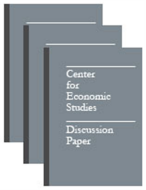Poach or Promote? Job Sorting and Gender Earnings Inequality across U.S. Industries
Poach or Promote? Job Sorting and Gender Earnings Inequality across U.S. Industries
Abstract
I outline the sociological theory that would predict that external labor markets – those in which more positions are filled with new hires rather from firm-internal promotions – heighten gender based discrimination and contribute to earnings inequality. I test this theory by treating industries as miniature labor markets within the US with varying levels of gender inequality and different hiring practices. Using high quality administrative data from 1985 to 2013, including detailed work histories from this period, I compare the earnings of alike men and women across industries with different levels of reliance on external markets at different times. I find that men experience greater unexplained earnings relative to women – unexplained in that it is not accounted for by work history or observable demographic characteristics – when a greater share of earnings increase events occur outside the firm.
Others in Series
Working Paper
Working Paper
Working Paper




